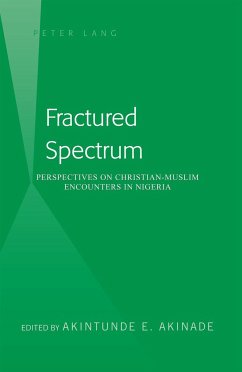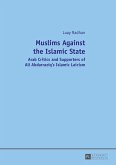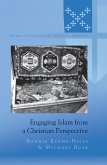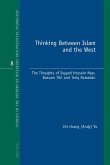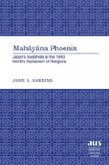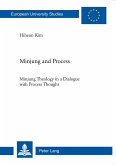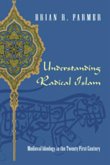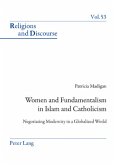In the twenty-first century, no one can ignore the complex paradigms connected with the precarious relationship between Christians and Muslims all over the globe. Since the seventh century, Christians and Muslims have interacted with one another in a variety of ways. This relationship is sated with both meaningful engagements and baffling ambiguities, running the gamut of constructive dialogue, lethargic encounters, open conflicts, and internecine violence. Nowhere is the need for interreligious cooperation, dialogue, and understanding more pressing than in the Christian and Muslim communities, which constitute approximately 60 percent of the world's population. Fractured Spectrum: Perspectives on Christian-Muslim Encounters in Nigeria deals with an important African dimension in Christian-Muslim relations. Nigeria, with its equal populations of Christians and Muslims, provides an auspicious case study for understanding the cultural, social, theological, economic, and political issues involved in Christian-Muslim encounters. The essays in this book, written by Christian and Muslim scholars who are actively engaged with the Nigerian context, examine some of the issues germane to Christian-Muslim relations in Nigeria.
«'Fractured Spectrum: Perspectives on Christian-Muslim Encounters in Nigeria' is an intellectually exciting and engaging book that probes interreligious dialogue among Christians and Muslims in Nigeria. The essays in this book bring new and fascinating perspectives as the researchers reposition interreligious dialogue and tension in the cultural, social, political, gender, and economic atmosphere of Nigeria. These creative and provocative essays offer a new understanding of the Nigerian situation that could establish possibilities for dialogue and peaceful co-existence. Everyone interested in the current dynamics of interreligious dialogue and contestation in Nigeria and Africa must read this book.» (Elias Kifon Bongmba, Harry and Hazel Chavanne Chair in Christian Theology and Professor of Religious Studies, Rice University, Houston, Texas)
«The fractures about which some of the contributors to this book write about are real indeed - always potentially imploding toward another clash of civilizations or an apocalyptic doomsday. However, the commitments both Muslims and Christians show in these pages to nurturing interreligious civility across the Nigerian landscape are palpable and commendable for the global Muslim-Christian encounter. Everyone who is concerned about the present and future of Muslim-Christian relations should read this book.» (Amos Yong, J. Rodman Williams Professor of Theology, Regent University School of Divinity, Virginia Beach, Virginia)
«Forceful and nuanced, this book interprets the complexities of the co-existence of Christianity and Islam in contemporary Nigeria. Without being pedantic, the book is a wake-up call to the seriousness of harmonious relationships and mature differentiation of religions, that will not be contaminated by partisan politics. This is an excellent book that takes the Nigerian reality seriously.» (Caleb O. Oladipo, Duke K. McCall Professor of Mission and World Christianity, Baptist Theological Seminary at Richmond, Virginia)
«Christian-Muslim dialogue is a trendy topic, but only a very few meet the intellectual and historical standards and many fail the ethical criteria. 'Fractured Spectrum', however, is a highly knowledgeable and critical book with insight and rigour which give us hope and provide signposts toward a path of religious peace and harmony [...] Given the awful bloodshed and chaos in Northern Nigeria, this book is a sign of great hope and of high paradigmatic value. I recommend this book as being of singular value for those interested in Christian-Muslim relations and who search for a just, pluralistically participatory, and diversely sustainable present with hope for the future.» (Charles Amjad-Ali, The Martin Luther King, Jr., Professor of Justice and Christian Community and Director of Islamic Studies, Luther Seminary, St. Paul, Minnesota)
«The fractures about which some of the contributors to this book write about are real indeed - always potentially imploding toward another clash of civilizations or an apocalyptic doomsday. However, the commitments both Muslims and Christians show in these pages to nurturing interreligious civility across the Nigerian landscape are palpable and commendable for the global Muslim-Christian encounter. Everyone who is concerned about the present and future of Muslim-Christian relations should read this book.» (Amos Yong, J. Rodman Williams Professor of Theology, Regent University School of Divinity, Virginia Beach, Virginia)
«Forceful and nuanced, this book interprets the complexities of the co-existence of Christianity and Islam in contemporary Nigeria. Without being pedantic, the book is a wake-up call to the seriousness of harmonious relationships and mature differentiation of religions, that will not be contaminated by partisan politics. This is an excellent book that takes the Nigerian reality seriously.» (Caleb O. Oladipo, Duke K. McCall Professor of Mission and World Christianity, Baptist Theological Seminary at Richmond, Virginia)
«Christian-Muslim dialogue is a trendy topic, but only a very few meet the intellectual and historical standards and many fail the ethical criteria. 'Fractured Spectrum', however, is a highly knowledgeable and critical book with insight and rigour which give us hope and provide signposts toward a path of religious peace and harmony [...] Given the awful bloodshed and chaos in Northern Nigeria, this book is a sign of great hope and of high paradigmatic value. I recommend this book as being of singular value for those interested in Christian-Muslim relations and who search for a just, pluralistically participatory, and diversely sustainable present with hope for the future.» (Charles Amjad-Ali, The Martin Luther King, Jr., Professor of Justice and Christian Community and Director of Islamic Studies, Luther Seminary, St. Paul, Minnesota)

